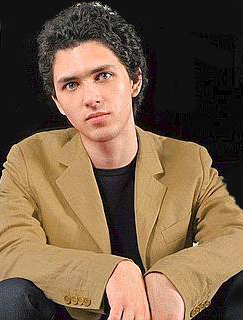In today’s music world, where a pianist hops on a plane to give a recital in Moscow one day, in New York the next day, then in London, he or she can live practically anywhere, as long as a big enough airport is close by. But in Bucharest? Why? Yes, it’s a capital city, but let’s face it, for most of us, it is quite unfamiliar. It is not considered Europe’s cultural heart, it is not a prime tourist destination, nor does it host political summits of great magnitude. On the other hand, why not? After all, this number one Romanian city has a lot to offer: eclectic architecture including medieval, neoclassical, art nouveau and bravely modern buildings (did you know that its Palace of the Parliament, with its imposing 3.55 million square feet, is the largest parliament building in the world?); a rich cultural life, with plentiful museums, art galleries, at least three symphonic orchestras, a national opera, wide-ranging theaters, and an abundance of further attractions. Definitely, it has a lot to offer to a receptive mind, to someone who dares to explore the unwalked paths. And artists do. Quite often they are also restless and leave their hometowns in pursuit of a perfect place, which time and again is determined by sheer coincidence. Sometimes they fall in love with its vibrant atmosphere or with the landscape, or with a person.
Eduard Kunz, who was born in Siberia, educated in Moscow and lived in England for some time, made his home in Bucharest, Romania, for personal reasons: Bucharest is his wife’s hometown and has become his haven and a base for extensive international travels. Kunz made news in the music world in 2011, when, despite the enthusiastic reception from the audience, who admired his charm and imaginative powers, he was eliminated in the third round of the International Tchaikovsky Competition. This music competition is one of the most glamorous and definitely most prestigious of all; its list of laureates includes such household names as Van Cliburn, Vladimir Ashkenazy and Mikhail Pletnev. This elimination created a huge controversy and drew criticism toward the jurors and the entire competition system. I asked Eduard Kunz about this experience.
Eduard Kunz: It seems like it was some 100 years ago. I was sad when I got eliminated, but, on the other hand, I had not expected anything. I wanted to participate just because, for me, it was the only chance to perform. I had already participated in 15 competitions (14 of which I had won) and know that winning a competition does not guarantee big earnings. It does not guarantee anything.
Bożena U. Zaremba: The audience loved you.Yes, the reception from the audience was overwhelming. I got around 500 e-mails and hundreds of Facebook messages. It was unbelievable.
Why do we so often see a big discrepancy between what the audience likes and what the jurors look for?
The problem is that on a given day the jurors have to listen to, let’s say, 30 pianists, and sometimes it is easy for them to miss a major talent. Anyway, I have put this chapter behind me. I am grateful that I have an opportunity to play, and now I am concentrating on my tour. I have 80 concerts this season, so there is a lot to focus on.
Besides graduating from the renowned Moscow Conservatory, you also studied in England. How do you compare those two learning experiences?
They are hard to compare because I was there at a different time of my life and was pursuing different goals. The Moscow Conservatory was great for musical discipline, but when you get to a certain age, you need to know how to perform. I did not have that opportunity in Russia, and that is why I left for England.
Now you are an instructor yourself, mainly as a master class teacher. What can a young pianist learn at your master class that he or she won’t learn at a conservatory or at a regular piano lesson?The nature of a master class is that I don’t have the student from the beginning to an end, so it has to be a quick injection of some principles that the student can use later. I get a chance to share some secrets and give the students extra energy.
So it is more inspiration than technical instruction?
It’s a little bit of both. In the short time I have with students, I try to tell them what they should
not be concentrating on.
Apart from being a solo pianist, you play some chamber music.Not too much, actually. It is this season that I started to play more. The problem is that I do not like the way orchestras work these days, and I don’t like how the conductors work. I don’t like to have to compromise. The relationship with the musician is as important as the relationship with the music, and in order to play chamber music well, you need to spend a lot of time with your partners to get to understand them. When I find the right person to work with, I do enjoy it very much.
What kind of a pianist do you, yourself, aspire to be?There are some great pianists out there. I enjoy some recordings; some, I don’t. I don’t have an ideal, although I do admire some artists, not only pianists and not necessarily from a classical field.
What is the message you want to convey in your music?In the last 10 years or so we have been experiencing this sensationalism in pianism. It is true for violinism and other artistic genres as well. This is what I call creative rubbish. People spend so much money and time on creating something—let’s say on special effects in a movie. Then you get two minutes on the screen and immediately forget what it was all about. Nowadays, people concentrate on a quick hit and on a quick return. This has nothing to do with the real thing.
What is the real thing?To aim for the difficulty. We are under constant pressure to make our art more popular, but this is simply a route to an end. This is a path to lose yourself. As Tolstoy said, if you ever row across a river you know you should aim higher to reach your destination on the other shore, as the current will put you downstream. Same in life: You should always aim higher because life will pull you down anyway. These days you make more money selling beer than selling books. You get more hits on YouTube by cheap sensation than by playing Bach.
What place does Chopin have in your repertoire?
In fact, at the beginning, Chopin did not come to me naturally. For me it is important to play music I can relate to. But I “warmed up” to him, and now I do relate to his music 100%. I feel very comfortable playing Chopin, and he has become a permanent part of my repertoire.
What quality in his music do you relate to?The sadness and the silence. Not the bravura. His music is very intimate. His mazurkas, for example, bring quiet and tranquility. It’s this intimacy and “tiredness” that I feel connection with.
At your Atlanta recital, besides pieces by Chopin, you are going to play a composition by another Polish composer, Ignacy Jan Paderewski*. Why him?
I am the winner of the Ignacy Paderewski competition, so his music has a special place in my repertoire and is close to my heart. I will perform his
Nocturne in B-flat, Op. 16, No. 4. I have recently heard a wonderful recording by Piotr Paleczny of Paderewski’s
Polish Fantasy and
Piano Concerto in A minor and was really inspired.
Don’t you think Paderewski’s music is a bit underestimated?Definitely. Internationally you don’t see his name at all. This is unfortunate because he is a fantastic composer. He is very intellectual and has great sense of humor. There is nothing artificial in his music. It’s like with Tchaikovsky’s
Concerto No. 2. Everybody knows his
Concerto No. 1, but not
No. 2, which is equally grand, but this is how the market works.
Someone has to introduce the public to the gem, whether it is Tchaikovsky or Paderewski. But the truth is that people prefer to listen to music they already know.Yes, maybe. We just need to put it in front of them, and then they will start to like it. For me the most important thing is to get pleasure from what you do. Of course, we change constantly and we discover beauty in new things. With time, your palette becomes wider and your experiences grow, but it is very important to keep your mind clear about what is real and what is less so.
The artist’s website:
http://www.eduardkunz.eu/
*To learn more about Paderewski, read this wonderful essay:
http://www.usc.edu/dept/polish_music/composer/paderewski.html 













